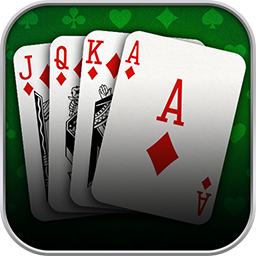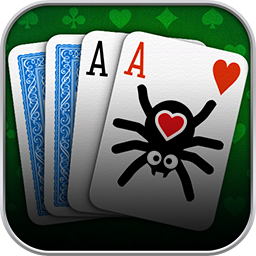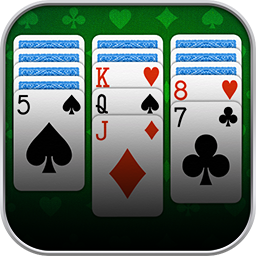You can easily pick up the rules of Pinochle online! We start at the fundamentals and then move through each step of a round in detail. You can also find deep dives into specific Pinochle rules in our Pinochle Lessons.
Pinochle is a type of trick-taking game and, thus, resembles card game classics such as Skat, Doppelkopf, and Sheepshead concerning the basic principles. Pinochle’s peculiarity lies in specific combinations of cards that you can meld before trick-taking. These so-called melds add points to your score.
The Aim When Playing Pinochle
You compete for the highest score, which you collect by the following Pinochle rules: Several rounds make up a table. After each round, the scores are determined: You sum up the points for melds and the pips or eyes gained by trick-taking. Points can also be subtracted for losing or forfeiting a game.
A table ends when you complete the initially declared number of rounds is completed. The player with the highest score wins the table!
Number of Players, Cards, and Preparations
In theory, two to eight players can join a game of Pinochle. Three- and four-player Pinochle is most common, though. Hence, we offer these two options at the Pinochle Palace and explain them in this manual.
In a Pinochle game of three, everyone opposes everyone:
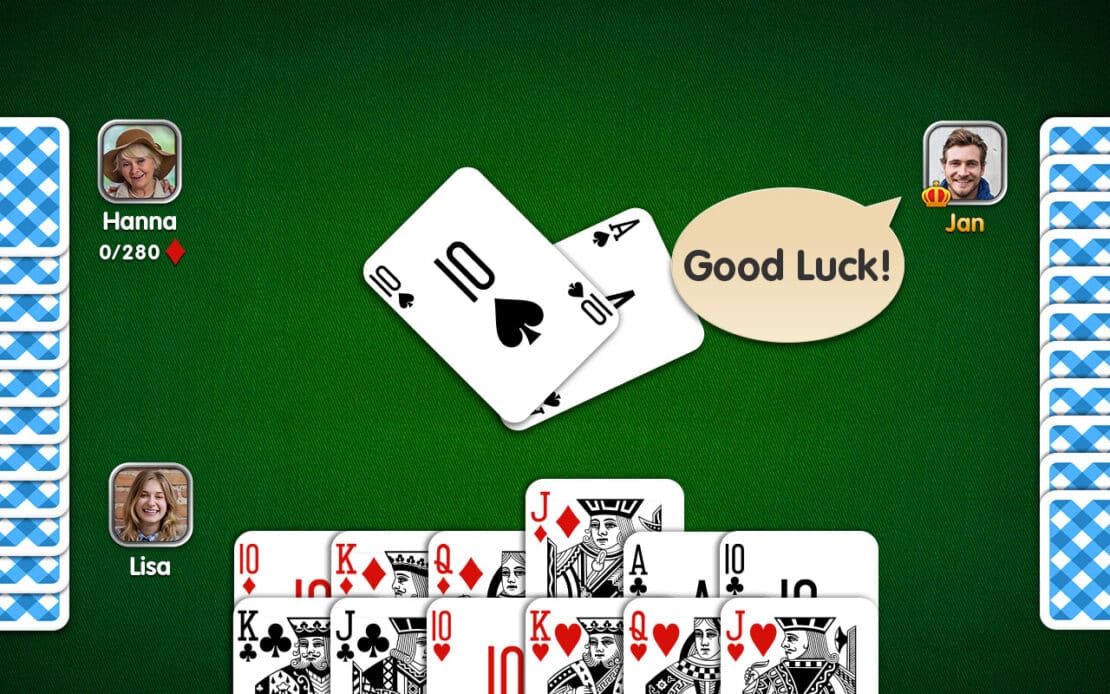
In a Pinochle game of four, the players facing each other form a team sharing their score. The teams play against each other. This way of playing is called Cross Pinochle.
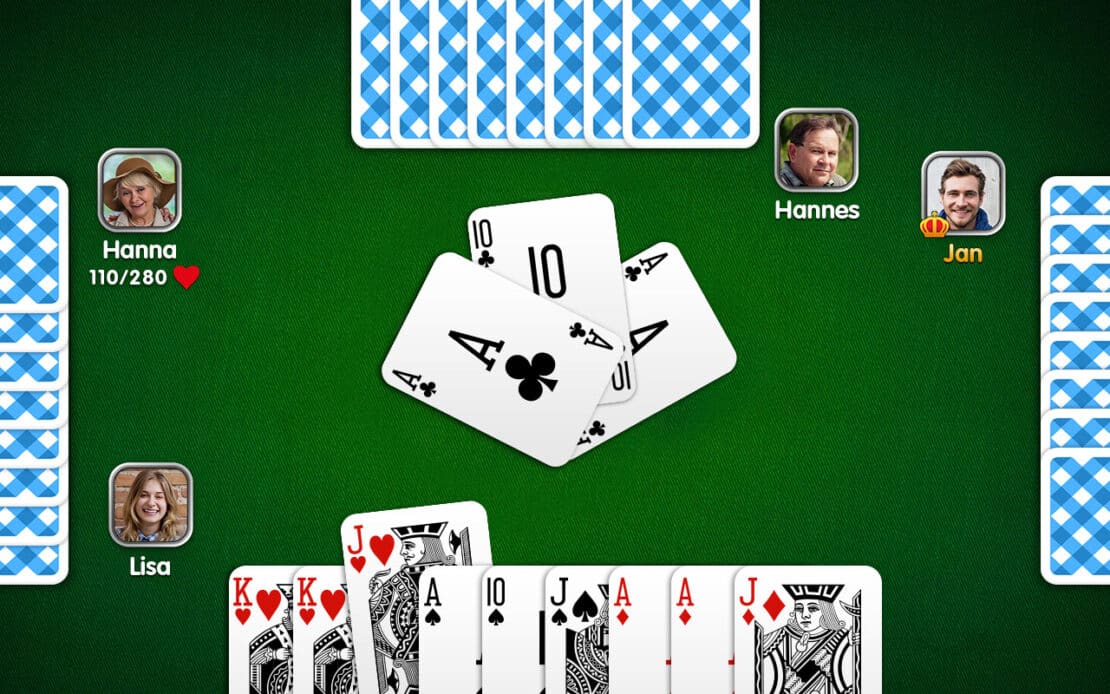
Pinochle traditionally uses 40 cards of the American pattern.
- The suits in descending order are Clubs, Spades, Hearts, and Diamonds.
- The ranks in descending order are Ace, Ten, King, Queen, and Jack.
These cards come in a double deck, which means each combination of rank and suit occurs twice.
Dealing and playing go counter-clockwise. The players get hand cards, and, usually, four cards are set aside as the kitty. The advantage of playing Pinochle online at the Palace? You do not need to worry about shuffling, cutting, and dealing correctly – the algorithm takes care of it for you!
Pinochle Rules for Bidding
After dealing, all players check their hand cards. How high should you bid? The highest bidder wins and becomes the declarer. But if you win the bidding and cannot reach your bid value with your score at the end of the round, you are likely to lose the table!
For Pinochle beginners, it could be worthwhile to avoid bidding at first and focus on learning trick-taking by the rules of Pinochle first. But bidding is no magic, and with these Pinochle instructions and our Pinochle Lessons, you can learn Pinochle online step by step. Hence, here are some aspects to keep in mind when pondering strategy and arithmetic.
Consider Points for Melds
Following the Pinochle rules, your points for melds only count if you manage to take at least one trick in the round. By the way, in our second Pinochle Lesson, we are detailing the topic of melds!
| Meld Name | Explanation | Points |
|---|---|---|
| Diss | The Seven or Nine of trumps | 10 |
| Marriage | King and Queen of the same suit | 20 (in trump suit 40) |
| Four of a Kind | Four cards of the same rank but different suit (No Tens, Nines or Sevens, if applicable) | Jacks: 40 Queens: 60 Kings: 80 Aces: 100 |
| Eight of a Kind | All cards of one rank | 1,000 |
| Pinochle | Jack of Diamonds and Queen of Spades | 40 |
| Double Pinochle | Both Jacks of Diamonds and Queens of Spades | 300 |
| Run | One card of each rank in one suit (five cards in total, no Sevens or Nines) | 100 (in trump suit: 150) |
| Double Run | All ten cards of one suit (no Sevens or Nines) | 1,500 |
Mind Points for Tricks
Here, it is key to estimate how many tricks you could take and how many eyes you could gain with a smart Pinochle strategy. In total, 240 eyes are available in the Pinochle game. Each card you win counts! Each card you win counts!
| Rank | Eyes |
|---|---|
| Ace | 11 |
| Ten | 10 |
| King | 4 |
| Queen | 3 |
| Jack | 2 |
| Seven, Nine | 0 |
During bidding, you analyze your hand, but you also add a little bit of speculation on your luck: After all, the declarer gets to pick up the stack of undealt cards, the kitty.
The Kitty
Depending on the number of players and cards, the kitty can contain three or four cards. That is an opportunity for the declarer to improve their hand. They pick up the kitty and then discard the same number of cards from their hand. When exchanging cards with the kitty, the declarer must consider using them to complete more melds or take more tricks. All the eyes in the discarded kitty are safe and will be added to the declarer’s score at the end of the round.
It is on: Forfeiting or Declaring?
After discarding the kitty, the declarer evaluates their new set of hand cards and decides: Should they stay, or should they go?
Option 1: Forfeiting Your Hand
If the declarer does not see a real chance to reach their bid value – after the kitty did not come with the desired cards, for example – they can forfeit and accept penalty points equal to their bid value. In this case, the following steps ensue:
- The declarer announces the trump suit. Example: “Forfeiting in Diamonds!”
- The declarer’s bid value is subtracted from their score. In Cross Pinochle, the same goes for their teammate.
- The remaining players take part in melding, and each receive ten bonus points per player. So +30 in a game of three and +40 each in a game of four.
- The forfeiter is not allowed to meld. In Cross Pinochle, that also applies to their teammate.
Caution: When the declarer does not forfeit, they must reach their bid value by the end of the round. Otherwise, they overbid, and twice their bid value will be subtracted from their trick-taking score. All points from melds would be voided as well. In most cases this is more punishing than the penalty for forfeiting!
Option 2: Declaring the Game
If the declarer is content with their hand, after discarding the kitty, they can start the game:
- They declare the trump suit.
- They start melding. Then, the other players meld counter-clockwise.
- Trick-taking begins.
Pinochle Rules: Trick by Trick
The one who started bidding also starts trick-taking. The other players follow counter-clockwise. The following rules apply in descending order:
- Suit compulsion: You must follow the suit of the trick’s first card, i.e., play a card of the same suit.
- Trick compulsion: If you can trick a played card with a higher card of the same suit, you must win the trick by playing it.
- Trump compulsion: If you cannot follow suit and have a trump card, you must win the trick by using your trump card.
You win and then receive a trick by contributing the strongest card. If there are two cards of the same strength in one trick, the card played first beats the second one. And finally, taking the last trick of a round awards ten additional points.
Counting: How Many Points Were Scored?
The full extent of the comfort in playing online at the Pinochle Palace is revealed during scoring: Nobody has to tally their points – the algorithm takes care of it. The points gained from melds are added to the pip values of the cards won during trick-taking. And the result is rounded up or down to the closest ten.
If the declarer reached or surpassed their bid value, they won the game. If they could not reach it, they lost the game. Twice their bid value is subtracted from their score and all points from melds are voided as well. In Cross Pinochle, all that applies to the declarer’s teammate, as well. After you have played the predetermined number of rounds, the player or team with the highest score wins.
Custom Pinochle Rules: Mix it Up!
Once you learned how to play Pinochle, our custom rules offer new challenges by stirring up our basic Pinochle rules. Though some variations might be slight, you must keep them in mind while bidding and trick-taking!
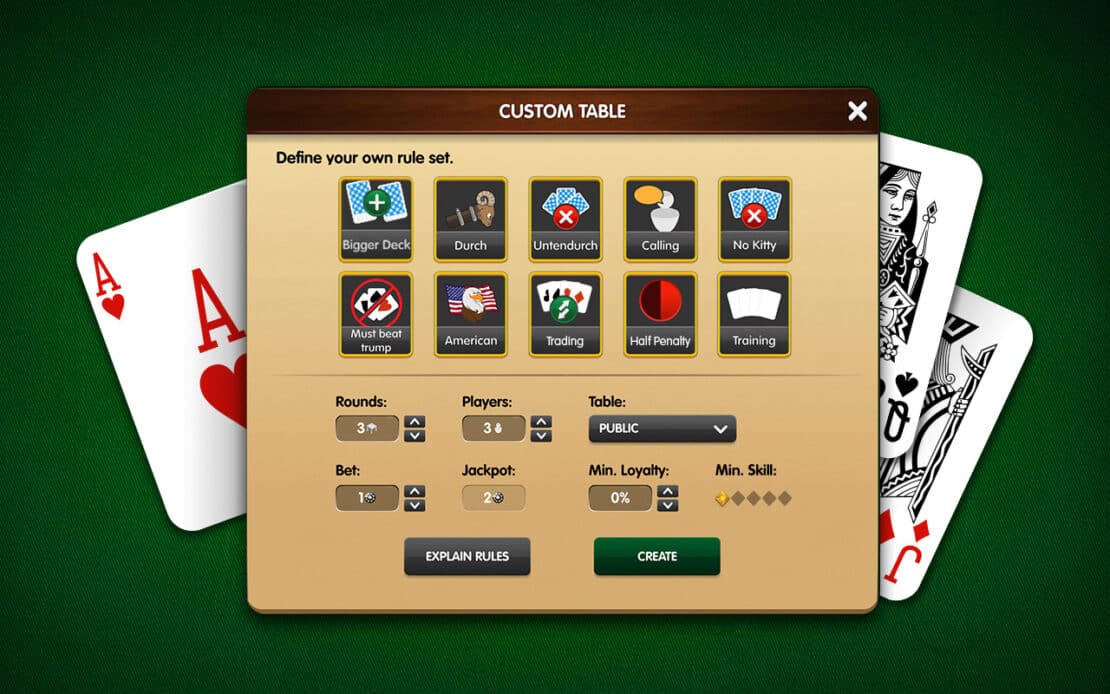
| Custom Rule | Description |
|---|---|
| Bigger Deck | This custom rule adds the Sevens to the deck, resulting in 48 playing cards in total. When you are playing with the custom rule American, the Nines are in use instead. |
| Durch | The game type Durch is added to the declarer’s game options. In that game type, there is no trump suit, the melding phase is skipped, and the declarer must win all tricks. If they succeed, they win 1,000 points for their team. If they miss the goal, they will lose 1,000 points instead. |
| Untendurch | The game type Untendurch is added to the declarer’s game options. There is no trump suit in that game type, the melding phase is skipped, and the declarer must not win a single trick. In a four-player game, the declarer’s team partner is allowed to win tricks. Only the tricks of the declarer are relevant. If they succeed, they win 1,000 points for their team. If they miss the goal, they will lose 1,000 points instead. |
| Calling | With this custom rule, the declarer may call a card they are lacking after discarding the kitty. You can only call cards that make sense: Each card exists twice. And when calling a card, you cannot have both in your hand or the kitty, respectively. The other players check counter-clockwise who has the called card. The first one must surrender it and will be compensated with another card from you. The bid value automatically rises to 400 when you employ calling. |
| No Kitty | With this custom rule, there is no kitty for the declarer to pick up. Instead, each player is dealt an additional card. You cannot use this rule in a game of three with basic rules. You need four players, the additional rule Bigger Deck, or both. |
| Must Beat Trump | With this custom rule, trick compulsion applies to the trump suit only. |
| American | American Pinochle is different from the German rule set: Nines are added to the deck, resulting in 48 playing cards in total. Additionally, the game goes clockwise, and different rules for melds apply. |
| Trading | This rule is not available in a game of three. In four-player Pinochle, trading eliminates the kitty by dealing all cards to the players. After the declarer announces trump, their partner chooses four cards to hand over to the declarer face-down. After picking them up, the declarer returns any four cards from their hand face-down as well. |
| Half Penalty | When the declarer does not make their bid, they now lose the number of points they bid instead of double the number. |
| Training | With this custom rule, the results of the table do not affect the league. You keep collecting experience points, though. |
American
Pinochle is widespread in the English-speaking US American area. Of course, the rules established there over time differ from the Württemberg Pinochle rules, or Binokel rules, which are the default in our game, and put an interesting spin on the game. Here, we list the differences in a neat overview:
| Default Game | American | |
|---|---|---|
| Deck | 40 cards: Ace, Ten, King, Queen, and Jack, each twice in four suits | 48 cards: Ace, Ten, King, Queen, Jack, and Nine, each twice in four suits |
| Card Rank’s Pip Values | • Ace: 11 • Ten: 10 • King: 4 • Queen resp. Ober: 4 • Jack resp. Unter: 2 | • Ace, Ten, King: 10 • Queen resp. Ober, Jack resp. Unter, Nine: 0 |
| Game Direction | counterclockwise | clockwise |
| First Trick | Forehand leads the first trick. | Declarer leads the first trick. |
| Kitty | Exists with three and four players. | Is omitted with four players. |
| Melds: Points for Eight of a Kind | always 1,000 | • Aces: 1,000 • Kings: 800 • Queens resp. Obers: 600 • Jacks resp. Unters: 400 • Tens and Nines: 0 |
| Melds: Runs and Double Runs | Count in any suit. | Only count in the trump suit. |
| Melds: Extended Runs | Don’t exist. | They are added and only count in the trump suit, too. • Run and King: 190 points • Run and Queen resp. Ober: 190 points • Run and Pair: 230 points |
| Custom Rule Trading | Can be optionally switched on with four players. | Is automatically active with four players at all times. |
| Custom Rule Half Penalty | Can be optionally switched on with any setup. | Is automatically active but can be switched off. |
If you activate the custom rule American, the custom rules Durch, Untendurch, and Calling cannot be combined with it.
You see, Pinochle does not only require a good hand but strategic thinking, too. Standard Pinochle or Custom rules – it is exciting anyway! Are you ready for the first round?
If you want more Pinochle tips and tricks for your Pinochle tactics, you can always browse our Pinochle Lessons. There we have a Pinochle Profile – Pinochle for beginners, so to speak.
More Palace Games
At the Palace of Cards, we offer plenty of other popular card games alongside Pinochle. For one, we have more trick-taking games – Skat, Doppelkopf, and Sheepshead. You can also have a go at our Solitaire games Klondike, Easthaven, Spider, and Scorpion. Or revisit classics, such as Rummy, Canasta, or Mau Mau.

